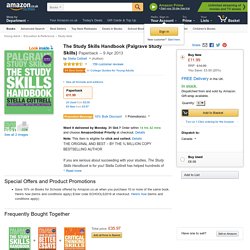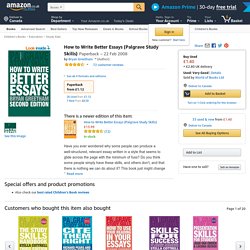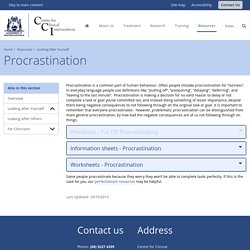Zoom
Trash
Related: Inspiration & Advice
- COACHING
- education
- What is coaching
- Train the Trainer
- Aktuelt
- Education
- Enterprise

The Study Skills Handbook. Review Praise for the fourth edition: 'Superbly organised and beautifully laid out, with really helpful worked examples and lots of practical tips, this guide is sensitive to the variety of students' learning styles and the different tasks demanded of them.

It's essential reading for students, but it's also an invaluable resource for instructors looking for strategies to enrich their teaching.' - Dr Ian W. Archer, Fellow and Tutor in History, Keble College, University of Oxford, UK 'It was a challenge to update a classic, but Cottrell's guide just gets better and better.' - Tracy Johnson, Skills Development Officer, Careers Service, University of Bristol, UK 'A comprehensive, practical and extremely user-friendly guide to studying at university and a crucial addition to any student's book list. 'The book offers a "one-stop shop" for the wide and varying area of study skills.
"This book just gets better and better. Book Description See all Product Description. Study Skills: mind maps, memory techniques, speed reading. Manage your study time. Help at hand for students to get more out of managing and planning time for studying Check your emails at fixed points during the day and let your voicemail take calls Begin with the most difficult subject or task first and focus on one key task at a time Are you juggling your work with distance learning and trying to find more time to fit in your studies?

Then help is at hand, in this article we take a look at how good time management will enable you to focus on study tasks that matter. Organising your time is a key starting point. Use a planner to block out your schedule for all of your commitments for study, work and personal or social life for the next few months. A single to do list is helpful with which you can use reminders to track progress and timers to start the next item. If you have a number of tasks to work through, prioritise important tasks from urgent and important first and lesser ones further down. If you multi-task too much you won’t get as much done in your time blocks. Tips to create a study plan.
Advice from LLM student Toby Boyd and a selection of useful planning schedule apps to plot your year ahead Work backwards from your exam dates to create a basic work plan Work out how many items you need to read per week to cover a module Before you embark on the road of learning, being prepared for the journey ahead is a good starting point.

A study plan isn’t just for exams, it is particularly useful for distance learning students to manage the year ahead with focus on both outputs and goals. We take a look at planning ahead with some advice from Toby Boyd and also highlight some helpful apps. Where to start Your study guides will point you in the right direction to essential things like reading lists, important websites for your subject area, the Online Library, exam papers on the VLE student portal and online discussion forums where you engage with your fellow students.
You should look up the readings online to determine how detailed and extensive they are. Skills for Study. Study skills: the complete guide to smart learning. Studywise 1: Study Skills for 11-14 Year Olds. Studywise 2: Study Skills for 14-16 Year Olds. Sail Through Exams! Preparing for Traditional Exams. How to write better essays. This book is worth its weight in gold for anyone who needs to write essays and I have recommended it to many of my friends.

I have always been able to write decent enough essays, getting A grade GCSEs and A/ B grade Alevels, but my undergraduate essays never quite seemed to reach the top marks. I couldn't quite understand this though because I always got top marks for my scientific reports, literature reviews, and exams yet my essays never seemed to go above a 2:1. If I put in a huge amount of effort I would be able to reach a high 2:1, while hardly any effort would get me a low 2:1, I just couldn't seem to break out of it! That was until I read this book. This book was an absolute delight to read.
Procrastination Self-Help Resources - Information Sheets & Workbooks. Overcoming Procrastination: This information package is designed to provide you with some information about procrastination and some suggested strategies for how you can address this problem.

It is organised into modules that are designed to be worked through in sequence. Although it is not necessary that you complete one module before going on to the next, this is recommended. Each module includes information, worksheets, and suggested exercises or activities. Module 1: Understanding Procrastination Part I This Module provides a definition of procrastination, and explores what you procrastinate about, how you procrastinate and common procrastination excuses you may use. Module 2: Understanding Procrastination Part II This Module examines the common unhelpful rules and assumptions that underlie procrastination, and explores how the positive and negative consequences of procrastination work to keep you procrastinating. Module 3: Changing Procrastination Download the entire workbook.